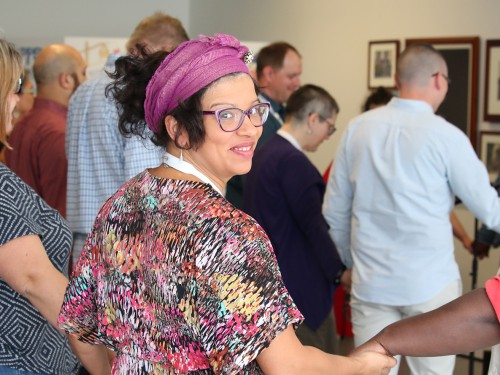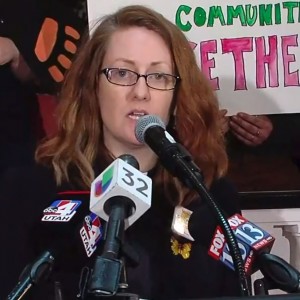Reflection on The Drum Major Instinct, IV

Mariela Perez-Simons, a student in Congregational Studies Signature Course of our MDiv program, offered this reflection to fellow students, faculty, and staff during the MLK service at Meadville Lombard. Hers was the fourth and final reflections on Dr. King's “The Drum Major Instinct” sermon.
The Drum Major Instinct. I’ve noticed it play out amongst some of my liberal friends who feel their “wokeness” makes them morally superior; who feel they can call out my Cuban friends who aren’t as woke as they are.
The truth is, my family doesn’t even know what Latinx means, or what mansplaining is, or any of the terms we woke people us. But believe me, they are woke enough to know what is like to go hungry for years, what eating out of a trash can does to your dignity, what having to sleep with tourists to buy medicine for your family does to your sense of worth. I can’t find a way to explain to my liberal American friends what political persecution and even torture does to your nervous system.
Grammar policing is another way this moral superiority shows up as. Not all of us had “the privilege” of growing up with English as our first language or go to schools where they teach “proper grammar.” Yet we are often made to feel inferior for that.
The drum major instinct doesn’t show up just in the United States, of course. Latin-America, where I’m from, has a long history of charismatic leaders whose drum major instinct drove them to the zenith of power only to oppress the masses.
And I’ll be honest: the drum major instinct dwells inside me as well. I saw it clearly during CPE (Clinical Pastoral Education). I came out of liberal theology with a brilliant, perfectly-thought-out theology. Thank you, Professor Hogue! But as I walked into rooms with the sick, the dying, and the poor, that theology clashed with theirs. During the first few weeks I found myself full of judgment; how can they believe that? That God could punish them like that!
One night, I was on call when I received a pager. A female patient who had been assaulted needed a therapist, but it was too late in the evening. They called the chaplain instead. I called my supervisor and said, “I can’t take that call. I’m not trained properly. She needs a therapist.” And the supervisor said to me, “Mariela, just go love on her.”
“Just go love on her.”
This is when my CPE experience shifted. Once I left my rational theology at the door and walked into those rooms with a heart full of love, I experienced something that can only be explained as Grace. The loving human connection that took place in those rooms completely transformed me.
It also transformed my theology; today I call it a theology of Love and Liberation. Love that comforts and Love that liberates.
I am talking about a Love, a passion for life that says “No!” to any form of discrimination, including the Drum Major Instinct that makes us believe we are somewhat superior because of the color of our skin, because of our education, our brilliant theologies, our wokeness.
I’ll close with these words from that sermon, because, of course, The King said it best:
Jesus gave us a new norm of greatness. If you want to be important—wonderful. If you want to be recognized—wonderful. If you want to be great—wonderful. But recognize the greatest among you shall be your servant.
And by giving that definition of greatness, it means that everybody can be great, because everybody can SERVE.
You don’t have to have a college degree to serve.
You don’t have to make your subject and your verb agree to serve.
You don’t have to know about Plato and Aristotle to serve.
You don’t have to know Einstein's theory of relativity to serve.
You don’t have to know the second theory of thermodynamics in physics to serve.
You only need a heart full of grace, a soul generated by love.
And YOU can be that servant.
May it be so!

Mariela Perez-Simons
Mariela Pérez-Simons is in Congregational Studies Signature Course, the second year of our MDiv program. She is originally from Cuba, now serving as a ministerial intern at Unitarian Universalist Fellowship of Winston-Salem, North Carolina. Before seminary, Mariela worked as a writer, translator, photographer, and web designer.

